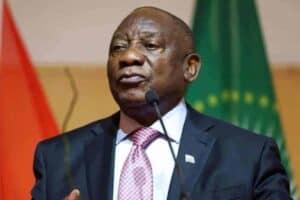President Cyril Ramaphosa chose not to oppose amaBhungane's challenge in the Constitutional Court.

The Constitutional Court (ConCourt) has reserved its judgment in amaBhungane’s case challenging the Executive Ethics Code relating to President Cyril Ramaphosa’s donations for his ANC presidential campaign in 2017.
The ConCourt’s full bench heard arguments from amaBhungane’s legal team in the confirmation proceedings on Tuesday.
ALSO READ: High court dismisses EFF case on CR17 bank statements
amaBhungane’s challenge comes after the Executive Ethics Code was found to be unconstitutional as it did not require members of the executive to disclose “donations made to campaigns for their election to positions within political parties”.
The Pretoria High Court, in December 2021, had ordered that the Act’s declaration of invalidity “shall have no retrospective effect and shall be suspended for a period of 12 months to allow for the defect to be corrected”.
This meant that the source of Ramaphosa’s CR17 campaign would remain undisclosed.
‘Bulwark against corruption’
amaBhungane’s lawyer, advocate Steven Budlender, on Tuesday argued that the investigative journalism body was seeking confirmation from the ConCourt regarding the Pretoria High Court’s ruling.
Budlender said Ministers, Deputy Ministers, and MECs should be required to disclose publicly donations made to their internal party political campaigns because there were instances that give rise to conflict of interest.
The advocate further argued transparency was part of the solution of solving this problem in order for the public to hold the members of the executive to account.
“The second [reason] is to act as bulwark against corruption. As this court explains it’s only when you have a mandatory disclosure that you have some prospect of acting as a bulwark against corruption,” he said.
ALSO READ: Another win for Ramaphosa as court dismisses Mkhwebane’s CR17 rescission application
He also said the Code did not provide the necessary specificity as required by the Executive Ethics Act – at points it merely repeats the Act’s provisions, instead of outlining what should be disclosed in some detail.
“This Code did not give rise to mandatory disclosure of all such donations. We submit that’s it’s plain that there is a problem.
“There is a constitutional problem, there is a problem in light of the Executive Ethics Act and it is a problem which renders the Code unconstitutional to this extend,” Budlender explained to the full bench.
Budlender added that Ramphosa’s decision not to oppose amaBhungane’s challenge demonstrated that “there is no proper defence of the Code available”.
“The president has recognised this much and therefore this court should confirm the order of the invalidity,” the advocate said.
The amicus curiae (friend of the court) in the case, Johannesburg Society of Advocates, also presented their opposing arguments to the court on Tuesday.
CR17 report
amaBhungane’s case also stemmed from Ramaphosa’s successful bid to challenge Public Protector Busisiwe Mkhwebane’s report on the CR17 campaign finances.
The ConCourt in July 2021 dismissed Mkhwebane’s application for leave to appeal.
The Public Protector had approached the ConCourt after her report into the CR17 campaign was set aside in March 2020 by the Pretoria High Court.
She released the report on the CR17 campaign in July 2019.
READ MORE: Mogoeng says Ramaphosa should have disclosed CR17 campaign donors
In the report, Mkhwebane found Ramaphosa had deliberately misled Parliament and recommended an investigation by the police into possible money-laundering.
However, the Constitutional Court majority judgment held that no law authorised Mkhwebane to investigate the private affairs of political parties.
The apex court also concluded Ramaphosa did not deliberately mislead Parliament about donations.
Mkhwebane’s rescission application on the previous ConCourt judgment was also was dismissed in March this year.






